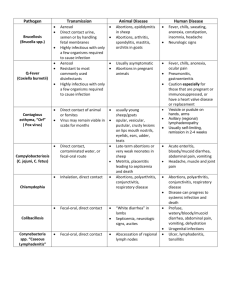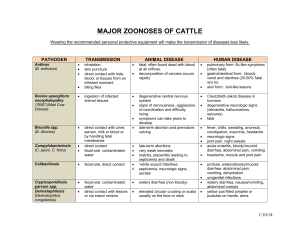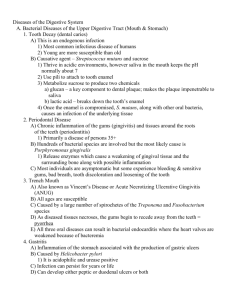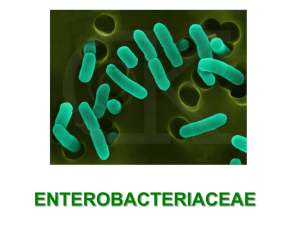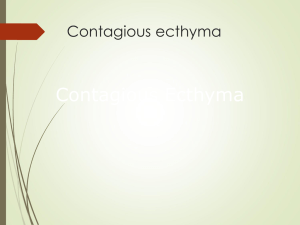ZOONOSES OF SHEEP AND GOATS
advertisement
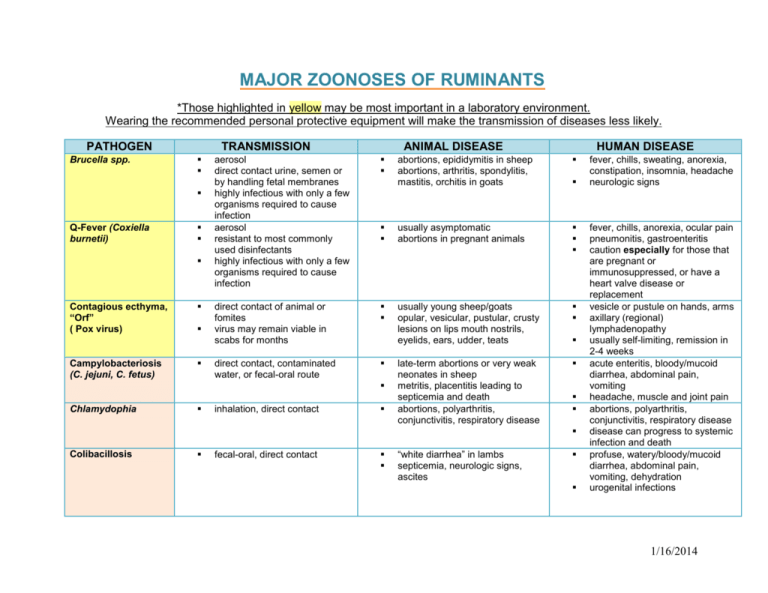
MAJOR ZOONOSES OF RUMINANTS *Those highlighted in yellow may be most important in a laboratory environment. Wearing the recommended personal protective equipment will make the transmission of diseases less likely. PATHOGEN Brucella spp. TRANSMISSION Q-Fever (Coxiella burnetii) Contagious ecthyma, “Orf” ( Pox virus) Campylobacteriosis (C. jejuni, C. fetus) ANIMAL DISEASE aerosol direct contact urine, semen or by handling fetal membranes highly infectious with only a few organisms required to cause infection aerosol resistant to most commonly used disinfectants highly infectious with only a few organisms required to cause infection abortions, epididymitis in sheep abortions, arthritis, spondylitis, mastitis, orchitis in goats usually asymptomatic abortions in pregnant animals direct contact of animal or fomites virus may remain viable in scabs for months usually young sheep/goats opular, vesicular, pustular, crusty lesions on lips mouth nostrils, eyelids, ears, udder, teats direct contact, contaminated water, or fecal-oral route late-term abortions or very weak neonates in sheep metritis, placentitis leading to septicemia and death abortions, polyarthritis, conjunctivitis, respiratory disease Chlamydophia HUMAN DISEASE inhalation, direct contact Colibacillosis fecal-oral, direct contact “white diarrhea” in lambs septicemia, neurologic signs, ascites fever, chills, sweating, anorexia, constipation, insomnia, headache neurologic signs fever, chills, anorexia, ocular pain pneumonitis, gastroenteritis caution especially for those that are pregnant or immunosuppressed, or have a heart valve disease or replacement vesicle or pustule on hands, arms axillary (regional) lymphadenopathy usually self-limiting, remission in 2-4 weeks acute enteritis, bloody/mucoid diarrhea, abdominal pain, vomiting headache, muscle and joint pain abortions, polyarthritis, conjunctivitis, respiratory disease disease can progress to systemic infection and death profuse, watery/bloody/mucoid diarrhea, abdominal pain, vomiting, dehydration urogenital infections 1/16/2014 PATHOGEN TRANSMISSION ANIMAL DISEASE HUMAN DISEASE Corynebacteria spp. “Caseous Lymphadenitis” Cryptosporidium parvum/bovis fecal-oral, direct contact abscessation of regional lymph nodes ulcer, lymphadenitis, tonsillitis fecal-oral transmission diarrhea can be asymptomatic Leptospirosis direct contact with urine, contaminated water, aerosol diarrhea especially in young or immunosupporessed animals can be asymptomatic fever, anorexia jaundice, hemoglobinuria, anemia abortion, infertility Listeria fecal-oral Mannheimia hemolytica (formerly Pasteurella hemolytica) inhalation, fecal-oral encephalitis, septicemia depression, paralysis of facial muscles, profuse salivation, strabismus “Shipping Fever”, secondary infection purulent nasal discharge, cough, diarrhea, malaise, hemorrhage infection may resolve asymptomatically or develop severe icterus, fever, headache, conjunctivitis, gastrointestinal signs, gastrointestinal hemorrhage meningitis, septicemia, abortions very severe in immunocompromised individuals bronchiectasis, bronchitis, pneumonia Sarcoptes scabei usually infests face, ears, forelimbs vesicle or papule formation, keratinization alopecia with intense pruritus usually infests face, ears, forelimbs, torso vesicle or papule formation, keratinization alopecia with intense pruritus direct contact, fomites 1/16/2014 PATHOGEN Spongiform encephalopathies (Scrapie, bovine BSE) TRANSMISSION ANIMAL DISEASE consumption or inoculation of/with infected tissue largest amount in the central nervous system may be present in colostrums, bone marrow, peripheral, and autonomic nervous tissue, and lymphoid tissue (not present in muscle) organism is resistant to all commonly use disinfectants and to autoclaving long incubation period (years) followed by neurological abnormalities HUMAN DISEASE scrapie not likely transmissible but extreme caution should be followed when handling infectious tissues. BSE is transmissible. long incubation period (years) followed by neurological abnormalities Vesicular Stomatitis (Rhabdovirus) direct contact, insect vectors mammary, interdigital, and oral vesicles with fever flu-like signs vesicles in mouth, hands, feet Tularemia (sheep) (Francisella tularensis) direct contact, wound infection, flea/tick vector lymphadenopathy of head, neck pneumonia high mortality lymphadenopathy, necrotic ulceration fever, conjunctivitis, bronchopneumonia Yersinia pseudotuberculosis abortions, suppurative orchitis, abscessation fecal-oral Salmonellosis (S. typhimurium, dublin, newport etc) fecal-oral direct contact fomites abortion acute and chronic enteritis septicemia in young animals acute abdominal pain, fever, vomiting, diarrhea arthritis, iritis, nephritis septicemia if immunocompromised severe diarrhea and debilitation Increased severity in the very old, the very young, and the immunocompromised. 1/16/2014 * Toxoplasma and Echinococcus are transmitted by consumption of infected tissue, so are unlikely to be encountered in a laboratory animal environment. IMPORTANT Many organisms may be present in large amounts of products of abortion. Thus, any aborting animal should be reported to ULAR ASAP. ALLERGENS OF SHEEP AND GOATS Allergens related to sheep and goats are not very common, but can occur due to contact with wool, handling/ingestion of meat or milk, or inhalation of allergens from animals. References Acha, PN and B Szyfres. 1989. Zoonoses and Communicable Diseases Common to Man and Animals. Pan American Health Organization, Washington, D.C. Committee on Occupational Health and Safety in Research Animals Facilities, Institute of Laboratory Animal Resources, Commission of Life Sciences, National Research Council. 1997. Occupational Health and Safety in the Care and Use of Research Animals. National Academic Press, Washington, DC. Smith, MC and DM Sherman. 1994. Goat Medicine. Lea & Febiger Publishing, Malvern, PA. 1/16/2014
